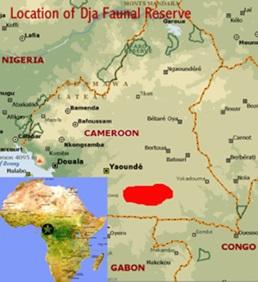
Strengthening the ability of local communities to sustainably manage the forests they call home is a main focus of the GEF-funded Congo Forests Integrated Programme led by UNEP under UNEP’s Congo Basin Landscapes Initiative. The Initiative is doing this by supporting local communities to develop and build partnerships between the private sector and local communities to catalyze and scale private sector investment.
The "Ebony Project” is an initiative supported by the GEF-funded Congo Forests Integrated Programme and executed in the Dja Faunal Reserve in Cameroon by the Congo Basin Institute. It is a great example of how private-public-partnerships unfurl in local communities and is just one way that the Congo Basin Landscapes Initiative is linking the private sector and local communities for mutual benefit.
The Ebony Project is a partnership between Taylor Guitars and communities in thirteen villages in south Cameroon. Taylor Guitars, which are played by some of the world’s most famous music stars, use Ebony wood in the guitars’ fretboard and bridge. The Project conducts basic ecological research, and supports an Ebony-based agroforestry system together with members of the forest communities. The Ebony tree is the main species being restored and managed, along with other fruit tree species. This approach offers concrete economic and social benefits to the communities involved while enhancing environmental sustainability in the thirteen villages.. In this way, the Project shows how to balance the needs of private businesses with government and locally led efforts around forest conservation and community development
In the Dja Faunal Reserve, the Ebony Project has worked hand in hand with local communities to counter the decline of the Ebony tree through training in best practices to counter deforestation and habitat loss, establishing Ebony nurseries, and launching large-scale replanting efforts. The impact has been significant: to date, local community members working as part of the Ebony Project have successfully planted 40,000 Ebony trees and over 25,000 fruit trees, many of them native.
At its core, the Ebony Project is helping safeguard the future of the Ebony tree and creating economic opportunities for communities in south Cameroon. The Ebony tree is currently listed as “vulnerable” on the IUCN (International Union for Conservation of Nature) Red List. Ebony wood is prized for its use in musical instruments. Its dense, fine-grained wood, deep black color, as well as its durability, make it one of the most valuable timbers in the world. Ebony is a slow growing tree; this, combined with the value placed on the wood, has led to overexploitation of the species. Habitat loss and deforestation have also contributed to the decline in Ebony tree populations.
While these Ebony trees require roughly 100 years to reach maturity, the seedlings and saplings planted as part of the Ebony Project are an investment in the future. They will not only support the health and biodiversity of tomorrow's forests but also ensure a sustainable supply for future musical instruments. This long-term approach demonstrates the Ebony Project's commitment to community livelihoods, environmental conservation and the preservation of musical craftsmanship.
Enabling effective Public-Private-Partnerships is essential for engaging with communities and strengthening their participation and contribution in the conservation and sustainable management of the Congo Basin Forest, and the Ebony Project is just one example of the vital work being carried out by the Congo Basin Landscapes Initiative.
Another example includes the work being done by the Initiative’s partner, the Rainforest Alliance, to support certification in cocoa value chains, also in Cameroon. At its core, the Congo Basin Landscapes Initiative recognizes the vital link between community well-being and forest conservation. It provides training and support to help forest communities become better stewards of their natural environment while also improving their livelihoods.
By encouraging collaboration between local communities and businesses, while supporting the incredible biodiversity of the Congo Basin, the Initiative is growing opportunities, nurturing ecosystems, and supporting a future where both people and forests thrive.
About the Congo Basin Landscapes Initiative
The UNEP-led multi-partner and multi-country Congo Basin Landscapes Initiative, through the GEF-funded Congo Forests Integrated Programme, is working with governments and partners on different fronts to catalyse transformational change in the conservation and sustainable management of critical forests in transboundary and national landscapes of the Congo Basin.
More information about the Initiative.
